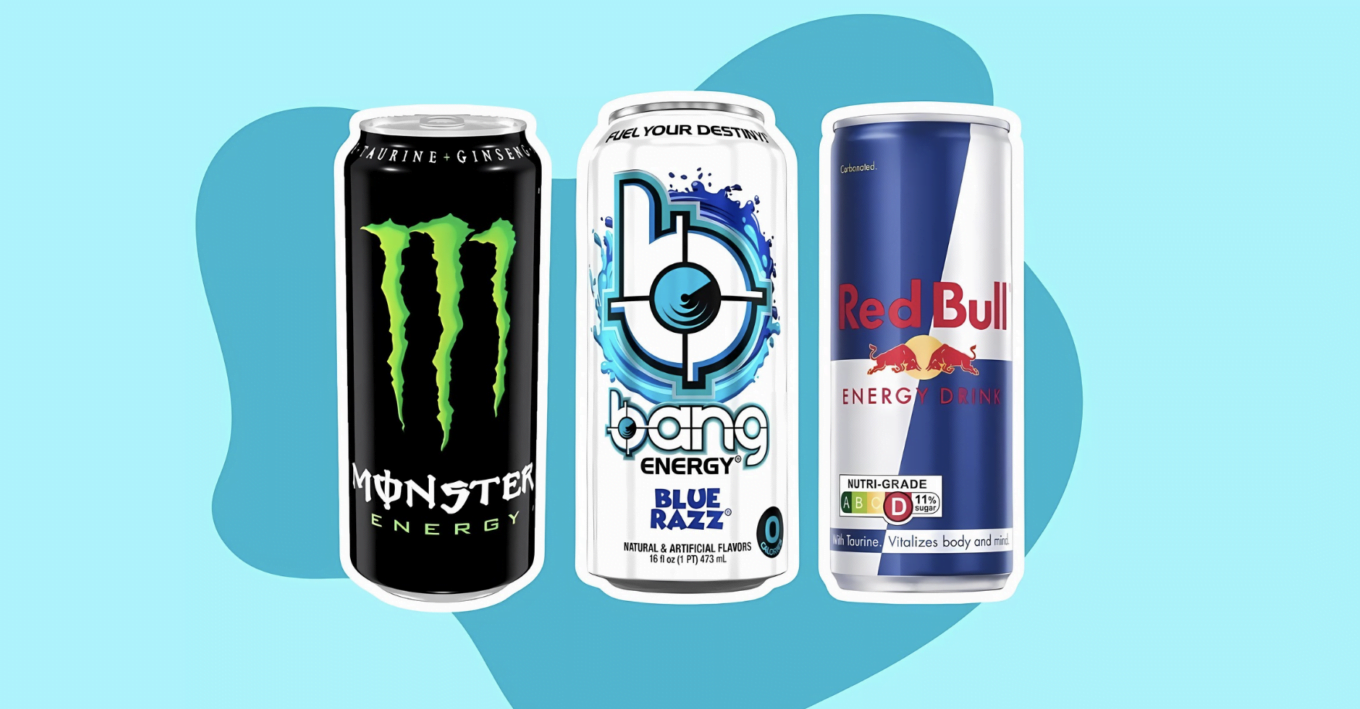Energy drinks are a quick fix for many people when they need a boost. You’ve probably seen the shelves packed with colorful cans, each claiming to be the strongest.
But how do you pick the right one? With so many options, it’s not easy to decide.
This post will help you find the best strong energy drink. It will explain what makes these drinks powerful and how to choose wisely.
We’ll examine caffeine content, other energizing ingredients, and factors to choose from.
By the end, you’ll know how to pick an energy drink that gives you the kick you want without overdoing it.
Let’s dive in and find your perfect energy boost!
Contrasting the Strongest Energy Drinks
| Energy Drink | Caffeine Content (mg) | Can Size (oz) | Key Ingredients | Taste | Energy Boost | Potential Crash |
|---|---|---|---|---|---|---|
| Red Bull | 80 | 8.4 | Taurine, B vitamins, Sugar | Unique, sweet, fizzy candy-like | Alert within 15-30 minutes, lasts a couple of hours | I might feel tired as it wears off |
| Monster | 160 | 16 | Taurine, B vitamins, Guarana, Sugar | Sweeter, citrusy fizz, like Mountain Dew | Strong, wide awake, and focused within 15 minutes | Bigger chance of a crash later |
| Rockstar | 120 | 12 | Taurine, B vitamins, Sugar | Fruity, sweet, less intense than Monster | Fast, alert, and focused within 20 minutes | There is less of a crash compared to stronger drinks |
| Celsius | 200 | 12 | B vitamins, Ginger, No added sugar | Fruity, refreshing, not overly sweet | Strong, energized, and focused within 15-20 minutes | No added sugar might reduce the crash |
| Bang Energy | 300 | 16 | EAA Amino Acids, CoQ10, Creatine | Candy-like, bold flavors | Intense, very alert, and focused, lasts several hours | High caffeine content, crash possible |
| Reign Total Body Fuel | 300 | 16 | CoQ10, BCAA Amino Acids, Electrolytes | Fruity, tasty | Strong and quick, ready for tough workouts | High caffeine content, crash possible |
Energy Drinks in the Market
1. Red Bull
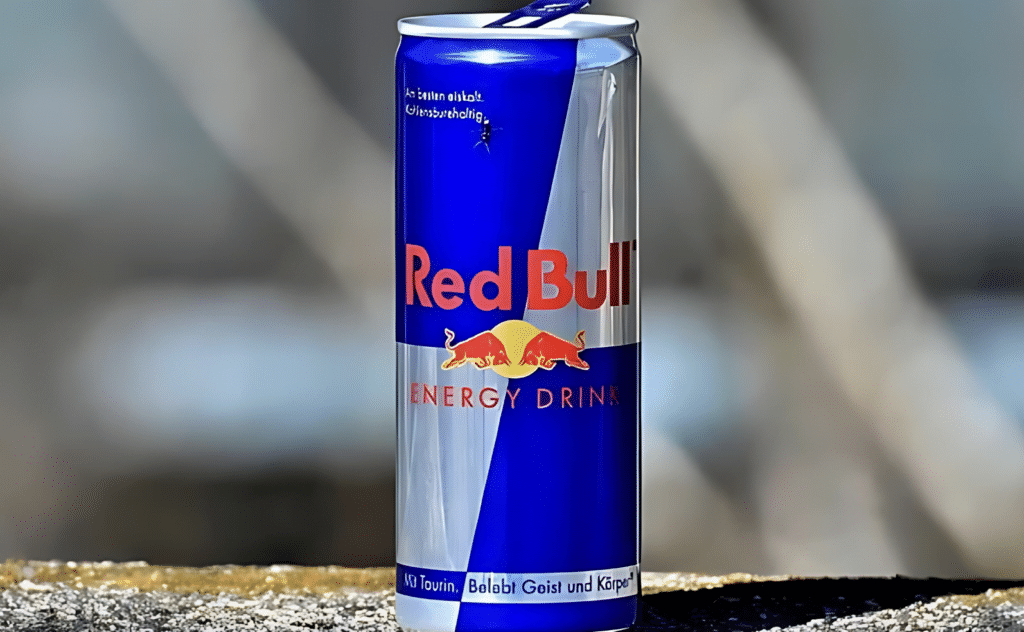
Red Bull is a big name in the energy drink world. Let’s look at what’s inside the can and how it might make you feel.
Caffeine Content: Each 8.4-oz can of Red Bull packs 80 mg of caffeine, which is about the same as a cup of coffee.
It’s enough to give you a nice lift without being too much for most people.
Pros: Red Bull is in most stores. It offers various flavors beyond the original, including sugar-free options.
The brand provides consistent quality and has a loyal following.
Cons: The original flavor has 27g of sugar per can, which is potentially too sweet for some. Its distinct taste divides opinions.
Users might experience a sugar crash later. The drink contains artificial ingredients.
2. Monster
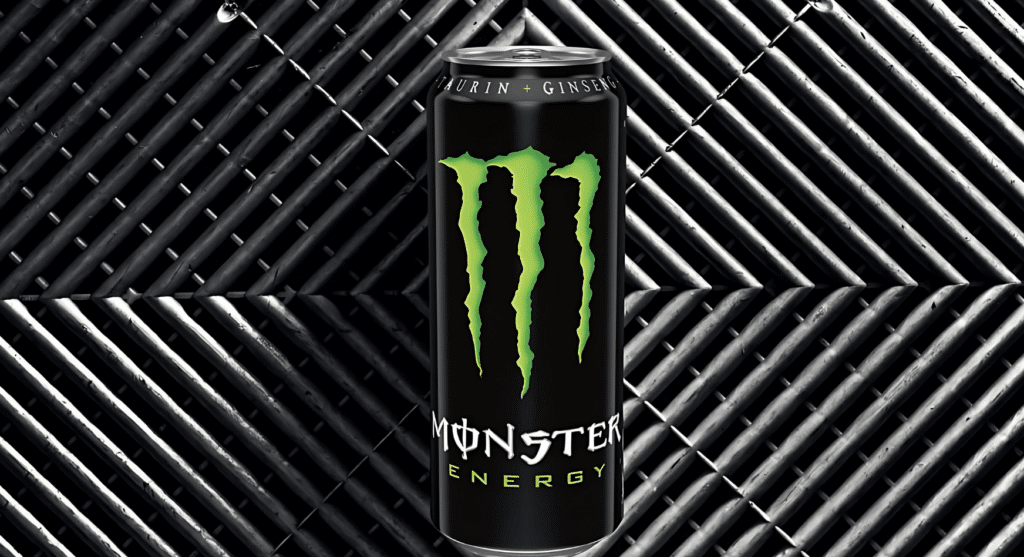
Monster is another big player in the energy drink game. Its big black cans with the claw mark logo are hard to miss. Let’s check out what Monster offers.
Caffeine Content: A 16-oz can of Monster has 160 mg of caffeine, double the amount in Red Bull. It’s a hefty dose that can get you going.
Pros: Monster offers a wide range of flavors, catering to different tastes. Its high caffeine and sugar content delivers a powerful energy surge.
The brand is known for its bold marketing and sponsorships in extreme sports. Large can size provides more drinks for the money.
Cons: A 16-oz can contain about 54g of sugar, more than double the recommended daily intake.
The combination of high caffeine and sugar can lead to a significant energy crash when the effects wear off.
Due to the high stimulant content, some may experience jitters or anxiety.
3. Rockstar

Rockstar is another well-known name in the energy drink world. Let’s examine what this drink offers.
Caffeine Content: A 12 oz can of Rockstar contains 120 mg of caffeine, which puts it between Red Bull and Monster in terms of caffeine strength.
It’s a good middle ground for those who want more than Red Bull but find Monster too strong.
Pros: Rockstar’s flavor is less intense than some competitors, making it more palatable for many. The energy boost tends to last longer, providing sustained alertness.
Rockstar offers a variety of flavors and formulations to suit different preferences.
Cons: A standard 12 oz can contains 37g of sugar, contributing to a high-calorie count. This sugar content may lead to an energy crash later.
Regular consumption could contribute to health issues like weight gain or dental problems.
4. Celsius
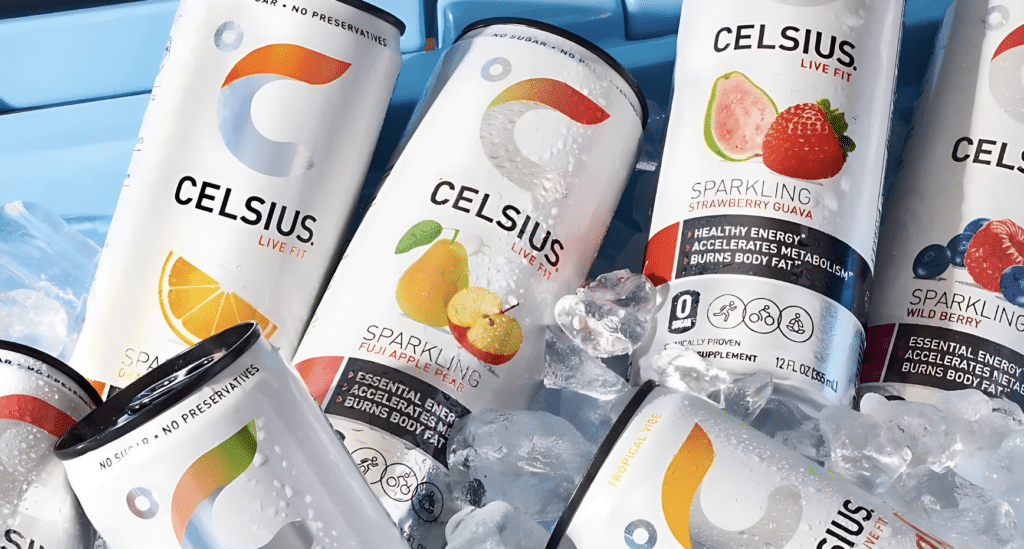
Celsius is a newer player in the energy drink market, but it’s quickly gaining fans. Let’s see what makes this drink stand out.
Caffeine Content: Celsius packs a punch with 200 mg of caffeine in each 12 oz can. That’s more than Red Bull, Monster, or Rockstar.
It’s designed for those who want a serious energy boost.
Pros: Celsius uses natural sweeteners instead of sugar, appealing to health-conscious consumers. It contains vitamins and “thermogenic” ingredients that are claimed to boost metabolism.
Celsius offers a clean energy feel without the sugar crash. It markets itself as a fitness drink, not just an energy booster.
Cons: The high caffeine content may lead to anxiety or restlessness in some users. Celsius typically costs more than traditional energy drinks.
The intense energy boost might be too much for those sensitive to caffeine.
5. Bang Energy
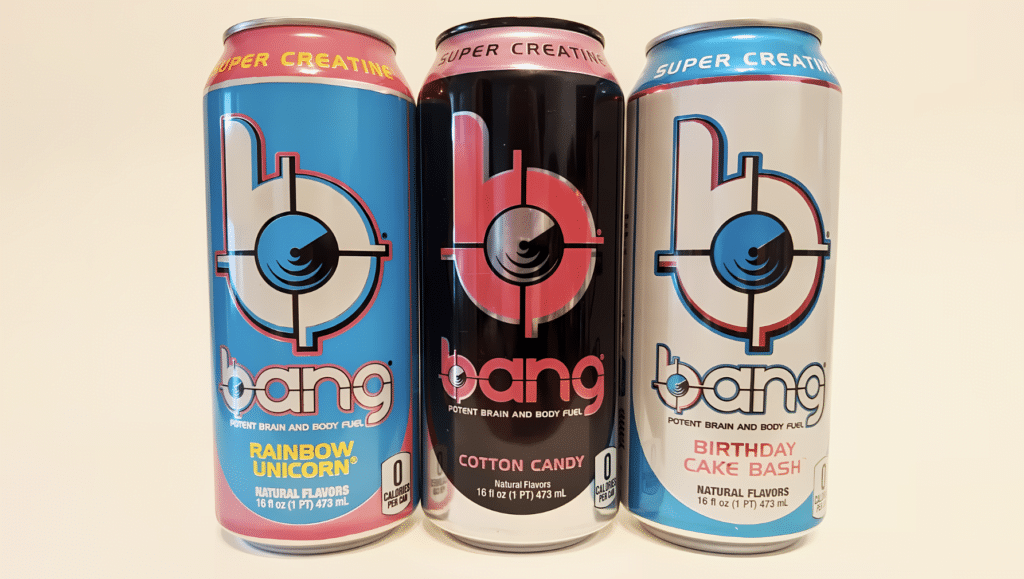
Bang Energy has made a big splash in the energy drink world. It’s known for its bold flavors and high caffeine content. Let’s take a closer look at what Bang offers.
Caffeine Content: Bang Energy packs 300 mg of caffeine in each 16-oz can, much more than most other energy drinks.
It’s meant for those who want a very strong energy boost.
Pros: Bang provides the most potent energy kick among popular brands. It includes performance-enhancing supplements like creatine and BCAAs.
The drink is sugar-free, using artificial sweeteners instead. Bang offers a wide variety of unique and bold flavors.
Cons: The high caffeine content may cause anxiety, jitters, or rapid heartbeat.
Overconsumption can lead to caffeine toxicity symptoms. The intense formula may be too strong for casual energy drink consumers.
6. Reign Total Body Fuel
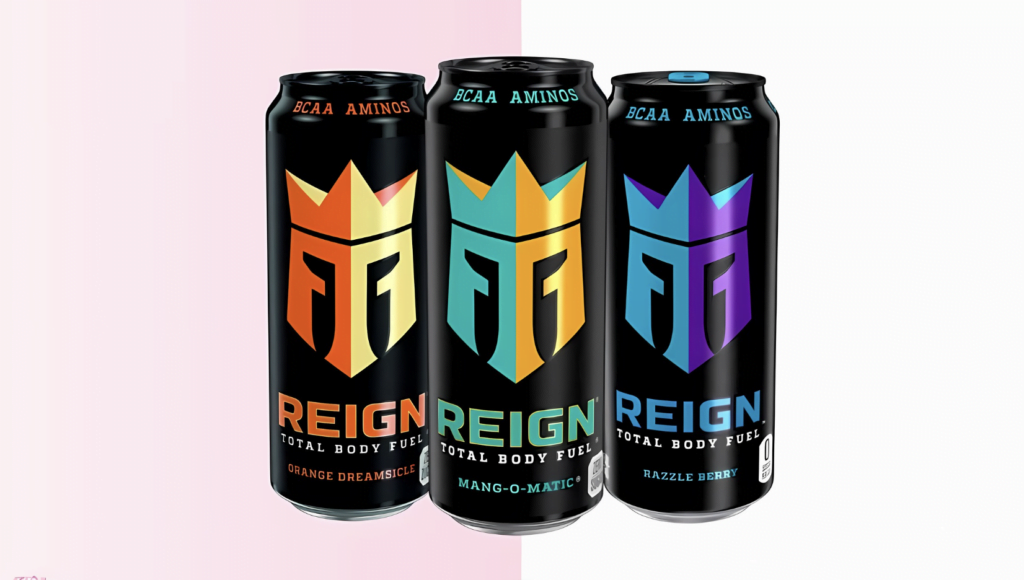
Reign is a newer player in the energy drink game, but it’s making waves. It’s aimed at people who work out and want a big energy boost. Let’s see what Reign has to offer.
Caffeine Content: Reign matches Bang with 300 mg of caffeine in each 16 oz can. That’s a lot of caffeine, about the same as three cups of coffee.
It’s meant to give you a serious energy kick.
Pros: Reign includes electrolytes to support hydration during physical activity. The drink is virtually calorie-free, appealing to those watching their intake.
It contains BCAAs and CoQ10 for potential performance benefits. Reign offers a variety of fruity flavors without added sugar.
Cons: The electrolyte blend results in higher sodium levels than some competitors. This may not be suitable for those on low-sodium diets.
The intense caffeine and supplement mix could be too strong for some users. Like other high-caffeine drinks, it may cause jitters or anxiety in sensitive individuals.
Factors to Consider When Choosing an Energy Drink
1. Caffeine Content
Caffeine is the main energy-boosting ingredient in most energy drinks. Let’s discuss what you need to know.
Different drinks have varying amounts of caffeine. Some have as much as three cups of coffee!
Most adults can safely consume up to 400 mg of caffeine daily, about four to five cups of coffee.
2. Sugar Content
Sugar can give you a quick energy boost but has downsides. Too much sugar can lead to a crash later, leaving you tired.
Many energy drinks are high in sugar. This can be bad for your teeth and overall health. Some brands offer sugar-free options.
These might be better if you’re watching your sugar intake.
3. Additional Ingredients
Energy drinks often contain more than just caffeine and sugar.
Guarana and ginseng are common additions. They might help boost energy and focus. B vitamins are often included. They help turn food into energy.
Taurine is another common ingredient. Some say it helps mental performance.
4. Purpose and Timing
Think about why and when you’re drinking energy drinks. If you’re drinking them for exercise, look for drinks with electrolytes to replace what you lose in sweat.
A milder drink might be better for daily use to avoid building up a tolerance. Avoid drinking energy drinks late in the day; they might interfere with sleep.
Conclusion
After examining various popular energy drinks, it’s clear that each offers unique benefits and drawbacks.
While Bang Energy and Reign Total Body Fuel pack the strongest caffeine punch at 300 mg per 16 oz, they may be too intense for many consumers.
In our opinion, Celsius is the strongest energy drink overall. With 200 mg of caffeine per 12 oz, it provides a potent energy boost without going overboard.
Its lack of added sugar and inclusion of healthier ingredients make it a more balanced choice for those seeking sustained energy.
Remember, the “strongest” drink isn’t always the best for everyone. When selecting an energy drink, consider your caffeine tolerance, health conditions, and energy needs.
Always consume these beverages in moderation and be aware of potential side effects.
Frequently Asked Questions
Are Energy Drinks Safe to Consume Daily?
Daily consumption isn’t recommended. Due to the high caffeine and sugar content, limit intake to occasional use. Excessive consumption may lead to health issues.
Are Energy Drinks Suitable for Teenagers?
Most health experts advise against energy drink consumption for teenagers due to high caffeine content and potential negative effects on developing bodies.
How do Energy Drinks Compare to Coffee?
Energy drinks often contain more caffeine and sugar than coffee. They also include ingredients like taurine and B vitamins that are not found in coffee.

